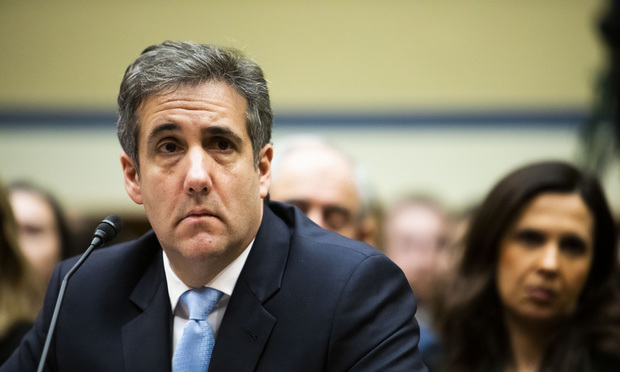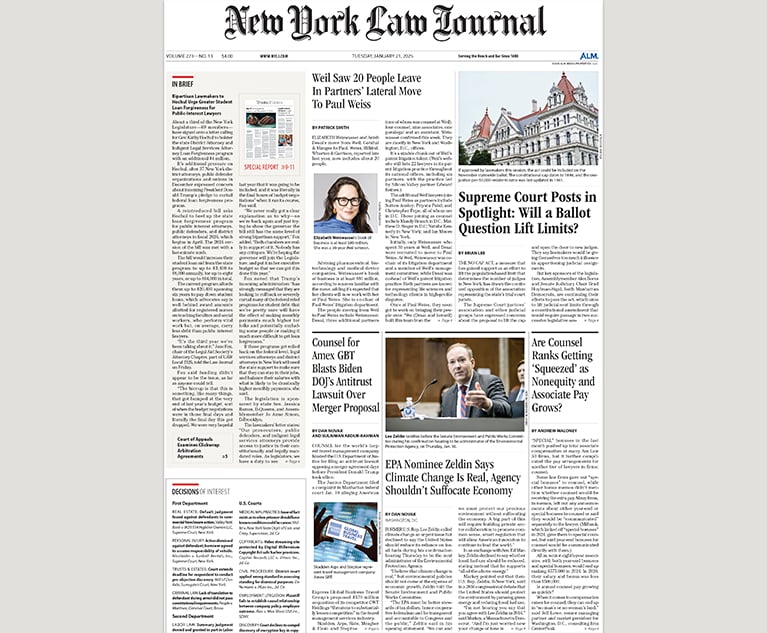Trump Org Must Face Claims in Michael Cohen Legal Fees Lawsuit
It's not yet clear how much of Cohen's hefty outstanding legal fees are related to investigations that could be covered by the Trump Organization's alleged commitment to pay his bills.
August 28, 2019 at 07:29 PM
4 minute read
 Michael Cohen. Photo: Diego M. Radzinschi/ALM
Michael Cohen. Photo: Diego M. Radzinschi/ALM
Michael Cohen, Donald Trump's incarcerated former attorney, has convinced a judge to allow discovery in part of his lawsuit seeking more than $1 million in legal fees against the president's real estate company.
Cohen sued earlier this year, seeking to make the Trump Organization cover the more than $3.8 million in legal fees and criminal penalties for which Cohen is liable. The Trump Organization said it made no open-ended commitment to pay Cohen's legal bills, however, much less the money he was ordered to pay as part of his convictions for tax, election spending and perjury-type offenses.
In a mixed ruling on a motion to dismiss, Manhattan Supreme Court Justice Joel Cohen on Wednesday agreed that the Trump Organization could not be required to pay Michael Cohen's criminal penalties, which is a position that his lawyers retreated from at oral argument earlier this month. But the judge concluded Cohen's alleged agreement with Trump Organization general counsel Alan Garten to have his lawyers' bills covered "is enforceable to the extent it covers legal proceedings and investigations that were pending in July 2017, when the agreement allegedly was made."
"It is not enforceable, however, with respect to legal proceedings and investigations that began after the agreement was reached," the judge wrote in his decision.
Cohen can now seek evidence to try to prove the Trump Organization understood the scope of the alleged commitment in the same way he did. The judge said in a footnote that "to be enforceable, such an agreement would have to be confirmed by the Trump Organization in writing, or by audio recording, or by the testimony of Trump Organization witnesses."
Justice Cohen noted that by the time July 2017 rolled around, committees of both the U.S. House of Representatives and the Senate had announced probes into Russian interference, Michael Cohen had received a subpoena from one of them, and special counsel Robert Mueller had been appointed. But he expressly ruled that the "criminal case against Cohen related to his alleged misleading congressional investigators" fell outside of that window.
Much of the judge's analysis hinged on the statute of frauds, which requires agreements that can't be performed within a year to be put in writing. He said Garten's alleged oral commitment didn't satisfy that law, nor did Cohen's production of a letter from his lawyer that referred to indemnification for a specific congressional probe, nor did the Trump Organization's payment of some of Cohen's legal bills.
But evidence of a commitment to pay legal bills incurred by the president's "fixer" for matters that were pending at the time of the alleged agreement may exist in the Trump Organization's records, the judge noted.
Cohen said in his complaint that his unpaid legal bills totaled $1.9 million, with more than $1 million owed to McDermott Will & Emery and the balance owed to firms including Petrillo Klein & Boxer, Blakely Law Group, Lanny Davis' law firm Davis Goldberg & Galper and Monico & Spevack.
"We are pleased with the court's decision permitting Mr. Cohen's case to proceed," W. Hunter Winstead, a lawyer at Gilbert who represents Cohen, said in an email. "We intend to pursue the litigation vigorously and to obtain full payment of Mr. Cohen's claims."
"The judge's decision was thoughtful and took a large chunk out of the plaintiff's claims," said Marc Mukasey of Mukasey Frenchman & Sklaroff, who represents the Trump Organization, in an email. "We look forward to doing away with the leftover claims in due course."
Read More
Judge Questions Michael Cohen's Bid for Indemnification From Trump Org
This content has been archived. It is available through our partners, LexisNexis® and Bloomberg Law.
To view this content, please continue to their sites.
Not a Lexis Subscriber?
Subscribe Now
Not a Bloomberg Law Subscriber?
Subscribe Now
NOT FOR REPRINT
© 2025 ALM Global, LLC, All Rights Reserved. Request academic re-use from www.copyright.com. All other uses, submit a request to [email protected]. For more information visit Asset & Logo Licensing.
You Might Like
View All
Neighboring States Have Either Passed or Proposed Climate Superfund Laws—Is Pennsylvania Next?
7 minute read
Trending Stories
- 15th Circuit Considers Challenge to Louisiana's Ten Commandments Law
- 2Crocs Accused of Padding Revenue With Channel-Stuffing HEYDUDE Shoes
- 3E-discovery Practitioners Are Racing to Adapt to Social Media’s Evolving Landscape
- 4The Law Firm Disrupted: For Office Policies, Big Law Has Its Ear to the Market, Not to Trump
- 5FTC Finalizes Child Online Privacy Rule Updates, But Ferguson Eyes Further Changes
Who Got The Work
J. Brugh Lower of Gibbons has entered an appearance for industrial equipment supplier Devco Corporation in a pending trademark infringement lawsuit. The suit, accusing the defendant of selling knock-off Graco products, was filed Dec. 18 in New Jersey District Court by Rivkin Radler on behalf of Graco Inc. and Graco Minnesota. The case, assigned to U.S. District Judge Zahid N. Quraishi, is 3:24-cv-11294, Graco Inc. et al v. Devco Corporation.
Who Got The Work
Rebecca Maller-Stein and Kent A. Yalowitz of Arnold & Porter Kaye Scholer have entered their appearances for Hanaco Venture Capital and its executives, Lior Prosor and David Frankel, in a pending securities lawsuit. The action, filed on Dec. 24 in New York Southern District Court by Zell, Aron & Co. on behalf of Goldeneye Advisors, accuses the defendants of negligently and fraudulently managing the plaintiff's $1 million investment. The case, assigned to U.S. District Judge Vernon S. Broderick, is 1:24-cv-09918, Goldeneye Advisors, LLC v. Hanaco Venture Capital, Ltd. et al.
Who Got The Work
Attorneys from A&O Shearman has stepped in as defense counsel for Toronto-Dominion Bank and other defendants in a pending securities class action. The suit, filed Dec. 11 in New York Southern District Court by Bleichmar Fonti & Auld, accuses the defendants of concealing the bank's 'pervasive' deficiencies in regards to its compliance with the Bank Secrecy Act and the quality of its anti-money laundering controls. The case, assigned to U.S. District Judge Arun Subramanian, is 1:24-cv-09445, Gonzalez v. The Toronto-Dominion Bank et al.
Who Got The Work
Crown Castle International, a Pennsylvania company providing shared communications infrastructure, has turned to Luke D. Wolf of Gordon Rees Scully Mansukhani to fend off a pending breach-of-contract lawsuit. The court action, filed Nov. 25 in Michigan Eastern District Court by Hooper Hathaway PC on behalf of The Town Residences LLC, accuses Crown Castle of failing to transfer approximately $30,000 in utility payments from T-Mobile in breach of a roof-top lease and assignment agreement. The case, assigned to U.S. District Judge Susan K. Declercq, is 2:24-cv-13131, The Town Residences LLC v. T-Mobile US, Inc. et al.
Who Got The Work
Wilfred P. Coronato and Daniel M. Schwartz of McCarter & English have stepped in as defense counsel to Electrolux Home Products Inc. in a pending product liability lawsuit. The court action, filed Nov. 26 in New York Eastern District Court by Poulos Lopiccolo PC and Nagel Rice LLP on behalf of David Stern, alleges that the defendant's refrigerators’ drawers and shelving repeatedly break and fall apart within months after purchase. The case, assigned to U.S. District Judge Joan M. Azrack, is 2:24-cv-08204, Stern v. Electrolux Home Products, Inc.
Featured Firms
Law Offices of Gary Martin Hays & Associates, P.C.
(470) 294-1674
Law Offices of Mark E. Salomone
(857) 444-6468
Smith & Hassler
(713) 739-1250








